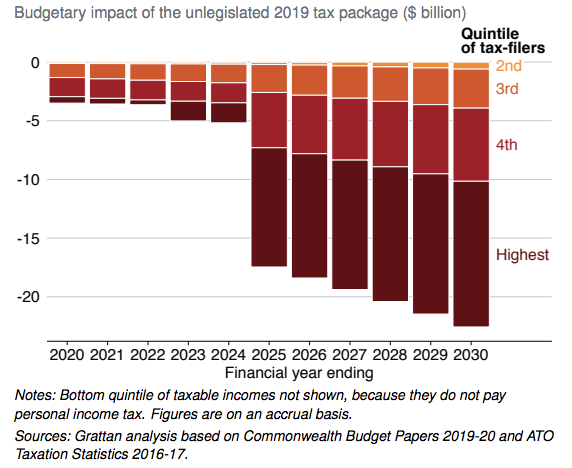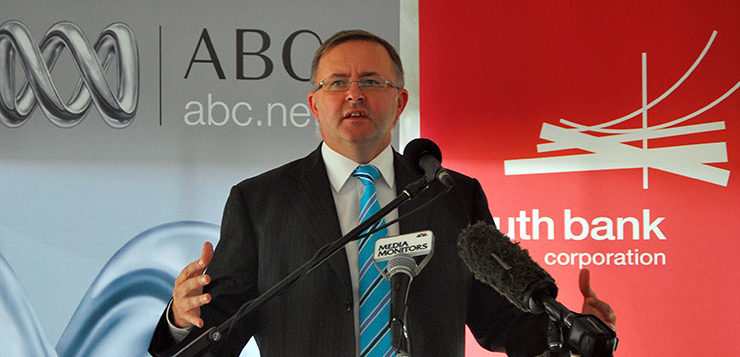DON’T MISS ANYTHING! ONE CLICK TO GET NEW MATILDA DELIVERED DIRECT TO YOUR INBOX, FREE!
These are dark days for the Australian left, writes Ben Eltham.
Anyone who thinks that elections don’t matter would do well to observe the smoking ruins of Australian social democracy this week, in the wake of Scott Morrison’s tax cuts.
As the Coalitions staggering $158 billion tax cut sailed through the Parliament last week , we caught a glimpse of a newer, stranger and grimmer Australia, a nation even more divided and unequal than we feared.
Seven weeks ago, Australia seemed headed towards a Shorten Labor government. The ALP had an ambitious policy agenda to make Australia fairer and more equal, winding back tax subsidies to the rich and investing heavily in health and education. Labor’s vision wasn’t exactly democratic socialism, but it was certainly a cautious step towards repairing the damage wrought by three decades of neoliberalism.
Less than two months and a surprise election victory later, Scott Morrison’s Coalition has just delivered one of the largest upward redistributions in modern Australian history.
What do the tax cuts mean? In the short term, voters get a handy tax rebate that will stimulate the ailing domestic economy. In the longer term, the passage of the massive tax bill heralds a new era of flat taxes in this country, pointing the way to a level of inequality that will make the discontents and resentments of the 2019 election look like kindergarten spats.
The tax cuts voted through this week will flatten Australia’s tax system in ways that few voters understand, but which will slowly and inexorably grind away what’s left of Australia’s communal life. Tens of billions of dollars of tax cuts will be handed to the wealthiest in our society. A ticking time bomb has also been set to detonate underneath the federal budget in 2024. If the Coalition is still in power, it will use it to slash Commonwealth spending to social services, ripping the guts out of education and Medicare, and further rending Australia’s threadbare social safety net.
The rich will get richer – much richer. They will use the extra disposable income to buy bigger houses, better holidays, and more expensive private schooling for their pampered children. For the well-to-do, times will be good. They will enjoy the last decades of a dying planet happily ensconced in a golden cage of conspicuous consumption.

On the other hand, the everyday life of the poor will worsen. Growth will remain sluggish and jobs scarce and increasingly insecure and casualised. The rent poorer Australians pay to absent landlords will keep ratcheting upwards, while a punitive government punishes anyone unlucky enough to claim welfare benefits.
The middle classes will be further hollowed out. Middle income earners will be squeezed between anaemic economic growth and spiralling economic inequality, struggling under massive mortgages in the futile dream of one day obtaining financial independence, all the while haunted by the ease with which all can slide away.
None of this will come to pass quickly. But then again, it’s not meant to. The tax cuts are a timeline, a direction towards which the Australian polity is being steered. The third stage of the Coalition’s tax cuts are scheduled for 2024. By then, those earning $200,000 a year will get a whopping $11,000 a year tax cut. Those on $45,000 will get just a few hundred. Those on minimum wage will get nothing – no tax cut at all.
The terrifying ease with which the tax cuts sailed through the House and the Senate last week shows clearly who holds the power in the new Parliament. Morrison’s victory means a government committed to governing for the middle- and upper classes (minus the noisy progressive bits), and most importantly vested interests in business. This week’s 4 Corners revelations about the scale of corporate water theft in Australia’s Murray-Darling is just the most obvious aspect. Business will also now get its wishes granted in areas like industrial relations, where further assaults on unions and the rights of workers are planned, in property, where the tax breaks of landlords and developers will be protected, and in banking, where the big banks will be protected from any meaningful reform.
One way of thinking about Morrison’s tax triumph is as the last gasp of the Howard years. For those who remember the cramped and often confined political debate of the early 2000s, there is much to remind. Once again the policy agenda is little more than an auction of tax cuts and giveaways to special interests; once again, the Labor Party seems shorn of any confidence in its values or mission. Corporations are again venerated as the sole and only source of employment, personal ambition in the form of “getting ahead” the chief goal acknowledged of citizens.
Morrison is revelling in his sudden elevation. Just a few months ago he seemed like a seat warmer. Now he looks like a two-termer, a three-termer, anything.
Morrison’s new Australia is only beginning to be examined by commentators; no doubt we will see plenty of overwritten think pieces in months to come.
Morrison’s Australia horrifies progressives and bewilders moderates. But for the Liberal base, it all seems perfectly sensible. Of course people want tax cuts. Of course the adults are in charge. Of course the mines should be dug, the farms should be irrigated, the churches should be praised. The silent majority, the quiet Australians, the sensible centre-right have re-asserted their rightful place as the fulcrum of Australian politics. It is as inevitable as Menzies, as natural as a mortgage, footy on Saturday and church on Sunday. It’s white bread and white faces and white picket fences.
ScoMo’s miraculous victory has been accompanied by a noticeable malaise on the left of politics. Progressives are despondent. The Labor Party looks clueless, the Greens irrelevant, trade unions impotent, GetUp embarrassed.
Not for the first time, the left in Australia has fundamentally underestimated the resilience and the organisation of everyday conservativism, in a small-holder democracy more concerned with housing prices than atmospheric carbon concentrations.
Even for those accustomed to the strange fragility of the modern Australian Labor Party, the weeks since May 18 have been something to behold. Barely had Bill Shorten resigned, before senior Labor figures began to announce that the problem was Labor’s supposedly radical left-wing agenda. Much heed was paid to figures like Joel Fitzgibbon, shaken by a big swing to One Nation in his Hunter Valley electorate. Jim Chalmers, the new shadow treasurer, rushed to reassure everyone that Labor had spent too much time attacking the “top end of town”, and that people earning $200,000 a year were by no means rich. That most nebulous of terms, “aspiration”, and Labor’s desire to recapture it, was on the tip of Anthony Albanese’s tongue. Over the weekend, he hinted he was dumping Labor’s policies on negative gearing.
Albanese’s flirtation with ‘aspiration’ is half right – many voters do long for a better life for themselves and their family. But if Labor had more courage, it could examine some more fundamental aspirations than a few hundred dollars of tax cuts. Could a party of workers also nurture hopes for a better society, an affordable dwelling, a safe climate, a steady job at a living wage? Ever the conscientious technocrats, contemporary Labor struggles to articulate such lofty goals – or even conceive of them.
All this culminated in the first week of Parliament’s return. In a few short days, Labor voted for the government’s tax cuts, voted against a motion to raise the rate of Newstart, and voted for a motion in support of the Carmichael coal mine and the opening up of the Gallilee coal basin. Even die-hard Labor supporters were horrified, while neutral observers were mystified.
For six years, Labor staked its electoral fortunes on a message of fairness and a suite of policies that sought to make Australia more equal. All of this now seems to have gone by the wayside. May 18 was certainly a bad shock. But it was scarcely a landslide. How could an election defeat, even one this disappointing, suddenly unmoor the ALP from its fundamental values? And why would a proud party, 130 years old, walk away from the progressive base that still accounts for a third of the electorate?
This points to something more worrying in the modern ALP: a fundamental confusion about what it stands for. Should the lives of workers simply be measured in dollar terms, or are there broader meanings, perhaps even spiritual yearnings? Does Labor now stand for workers on $200,000 a year, but not for those on unemployment benefits? If the ALP’s sole purpose is to win power to enhance the lives of working people, what can it achieve in opposition?
Even in the cold-hearted Machiavellianism of political calculus, Labor’s collapse of political will makes little sense. The contemporary political environment has never been less receptive to bipartisanship. Party supporters fervently want Labor to fight, while disengaged voters have switched off for the next three years. Most ordinary voters hold all politicians in contempt, so they don’t care what they do or say. Labor gains nothing from voting for government legislation, except the contempt of its own supporters. In contrast, an opposition party prepared to oppose would quickly regain the loyalty of its base, as Tony Abbott showed in 2009.
If Labor is prepared to exert meaningful opposition, it could quickly gain political traction. Morrison’s political ascendency is shocking for Labor, but it is also vulnerable. Australia faces looming economic, social and environmental crises. The Coalition government remains fundamentally disconnected from the realities that confront our nation. A quick win on tax will mean little to voters in three years if the economy slides into recession; by definition, tax cuts can do nothing for Australia’s most pressing crises, which are social and environmental.
But before it can oppose the government, Labor must decide what it now stands for.
The ALP’s agony reveals a stark truth: the ALP is irrelevant in the new Parliament. The Coalition governs, while Rex Patrick and Jacqui Lambie control the Senate balance of power. Labor can oppose government bills out of principle, or vote for them from political calculation, but neither action much matters (the same could also be said for the Greens).
What Labor really needs to do is to forget about the navel gazing, get out of the office, and start over on the thankless task of building a social movement for change. The same is true for the Greens. Until the parties of the Australian left can win significant numbers of ordinary citizens over to a renewed vision for a fairer society, they will continue to wander in the wilderness.
Until then, Morrison holds all the cards.
DON’T MISS ANYTHING! ONE CLICK TO GET NEW MATILDA DELIVERED DIRECT TO YOUR INBOX, FREE!
Donate To New Matilda
New Matilda is a small, independent media outlet. We survive through reader contributions, and never losing a lawsuit. If you got something from this article, giving something back helps us to continue speaking truth to power. Every little bit counts.




